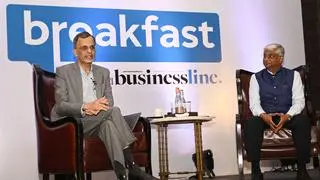Rising crude prices are once again pushing up petrol and diesel prices for Indian consumers, with the pressure mounting on the Central government to lower excise duty.
On Tuesday, after remaining stable for three days, the retail selling price of petrol and diesel in Mumbai rose to a record high of ₹93.83 per litre and ₹84.36 per litre, respectively.
Brent crosses $60
Prices have been soaring in January as global crude prices have climbed up. On Monday, Brent crude for April had crossed the $60 mark, and is likely to rise further as oil producing nations restrict their supply.
The government introduced an Agriculture Infrastructure and Development Cess of ₹2.5 per litre on petrol and ₹4 per litre on diesel, but had lowered the excise duty on petrol and diesel by the corresponding amount to make sure the new tax did not raise prices further.
However, “these lowered excise duty levels remain quite high compared to pre-Covid levels”, said Prashant Vasisht, Vice-President and Co-Head, Corporate Ratings, ICRA.
In the first half of 2020, when crude prices slumped as economies across the world shut down to contain coronavirus, the Central government had followed its long-standing strategy of hiking the excise duty, instead of passing the benefit of lower crude prices onto consumers.
In two hikes in March and May last year, the government raised excise duty on petrol by a total of ₹13 per litre and on diesel by ₹16 per litre.
Since it assumed office in 2014, Prime Minister Narendra Modi’s government has raised excise duty on petrol and diesel by nearly 350 per cent and 894 per cent. The Budget did reduce the excise duty but only for the new agri cess to balance the gap.
VAT to go up
Moreover, rising crude prices will also drive up the value added tax (VAT) imposed by States since VAT is an ad valorem tax, and grows with a rise in crude prices. This is bound to push retail prices further up.
“With crude oil prices increasing it would be prudent for the sake of the consumers to revise the excise duty rates, which have remained the same since May 2020,” said Urvisha Jagasheth, Research Analyst at CARE Ratings. “If not, then fuel prices could cross the ₹100 per litre mark in certain States.”
Even though till now the incidence of the agri cess isn’t affecting the final price as there has been substitution with the reduction of the excise duty, “going forward, once the price of crude goes up, the passthrough will happen unless the excise duty is lowered”, Jagasheth added.








Comments
Comments have to be in English, and in full sentences. They cannot be abusive or personal. Please abide by our community guidelines for posting your comments.
We have migrated to a new commenting platform. If you are already a registered user of TheHindu Businessline and logged in, you may continue to engage with our articles. If you do not have an account please register and login to post comments. Users can access their older comments by logging into their accounts on Vuukle.